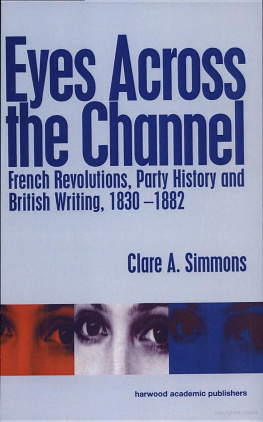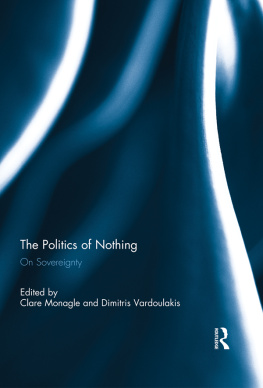Clare Pettitt - Serial Revolutions 1848: Writing, Politics, Form
Here you can read online Clare Pettitt - Serial Revolutions 1848: Writing, Politics, Form full text of the book (entire story) in english for free. Download pdf and epub, get meaning, cover and reviews about this ebook. year: 2021, publisher: OxfordUP, genre: Politics. Description of the work, (preface) as well as reviews are available. Best literature library LitArk.com created for fans of good reading and offers a wide selection of genres:
Romance novel
Science fiction
Adventure
Detective
Science
History
Home and family
Prose
Art
Politics
Computer
Non-fiction
Religion
Business
Children
Humor
Choose a favorite category and find really read worthwhile books. Enjoy immersion in the world of imagination, feel the emotions of the characters or learn something new for yourself, make an fascinating discovery.
- Book:Serial Revolutions 1848: Writing, Politics, Form
- Author:
- Publisher:OxfordUP
- Genre:
- Year:2021
- Rating:5 / 5
- Favourites:Add to favourites
- Your mark:
- 100
- 1
- 2
- 3
- 4
- 5
Serial Revolutions 1848: Writing, Politics, Form: summary, description and annotation
We offer to read an annotation, description, summary or preface (depends on what the author of the book "Serial Revolutions 1848: Writing, Politics, Form" wrote himself). If you haven't found the necessary information about the book — write in the comments, we will try to find it.
Serial Revolutions 1848: Writing, Politics, Form — read online for free the complete book (whole text) full work
Below is the text of the book, divided by pages. System saving the place of the last page read, allows you to conveniently read the book "Serial Revolutions 1848: Writing, Politics, Form" online for free, without having to search again every time where you left off. Put a bookmark, and you can go to the page where you finished reading at any time.
Font size:
Interval:
Bookmark:


Great Clarendon Street, Oxford, OX2 6DP, United Kingdom
Oxford University Press is a department of the University of Oxford. It furthers the Universitys objective of excellence in research, scholarship, and education by publishing worldwide. Oxford is a registered trade mark of Oxford University Press in the UK and in certain other countries
Clare Pettitt 2022
The moral rights of the author have been asserted
First Edition published in 2022
Impression: 1
All rights reserved. No part of this publication may be reproduced, stored in a retrieval system, or transmitted, in any form or by any means, without the prior permission in writing of Oxford University Press, or as expressly permitted by law, by licence or under terms agreed with the appropriate reprographics rights organization. Enquiries concerning reproduction outside the scope of the above should be sent to the Rights Department, Oxford University Press, at the address above
You must not circulate this work in any other form and you must impose this same condition on any acquirer
Published in the United States of America by Oxford University Press
198 Madison Avenue, New York, NY 10016, United States of America
British Library Cataloguing in Publication Data
Data available
Library of Congress Control Number: 2021942709
ISBN 9780198830412
ebook ISBN 9780192566157
DOI: 10.1093/oso/9780198830412.001.0001
Printed and bound in Great Britain by Clays Ltd, Elcograf S.p.A.
Links to third party websites are provided by Oxford in good faith and for information only. Oxford disclaims any responsibility for the materials contained in any third party website referenced in this work.
For Kitty and Marina
I nostri gioielli
In 1848 Europe became newly conscious of itself. But in Britain, 1848 revealed a schism between Europeans and Little Englanders. A schism which is still with us: I was researching and writing Serial Revolutions:1848 across the Brexit referendum and up to the final throes of Boris Johnsons Brexit negotiations. I finished this book during the first lockdown caused by the COVID-19 crisis, an epidemic which pushed Brexit out of the news headlines to reveal instead the fragility and futility of national boundaries in an irreversibly globalized world. Just as I was finishing the first draft of the book, the Black Lives Matter protests started their own serial global movement. In the US they moved from state to state, in Europe from country to country, city to city. Unlike the revolutions of 1848, they were largely peaceful and bloodless. But the call to think politically again about the social was like a dja vue. For nearly two centuries since Frederick Douglass called out the gross injustice and cruelty to which [the black woman and man] is the constant victim, that cruelty and injustice has shown little sign of abating. As historians, literary critics, academics, and citizens, we need to know our history better. We need to better understand how European our British identity truly is, and how the violence of empire and the catastrophe of slavery are still determining our modern world. The nationalisms of 1848 which had briefly seemed to belong to the people were quickly co-opted and they developed into something much darker in the late nineteenth and twentieth centuries. Now nationalism seems to have taken deep root. We live with and in history, and it is not inevitable that the history of today will necessarily be any less appalling than that of yesterday. But 1848 also generated ideas of universalism, pacifism, feminism, and different versions of socialism and communism. Returning to 1848, we can choose to look back on that springtime of the peoples as a moment of tragi-comic failure, obliterated by the brutalities that followed, or we can look again, and see it as a proleptic moment of stored potential, an extraordinary series of events that generated long-distance and sustainable ideas about global citizenship, international cooperation and a shared and common humanity which have not yet been fully understood or realized. The springtime of 1848 has been long delayed, but, with some effort, and more understanding, we can bring its forgotten meanings back to life so they can blossom and flourish in the present.
I gave very full acknowledgements in the first volume of this series, Serial Forms: The Unfinished Project of Modernity 18151848, and as this second volume goes to press only eighteenth months later, I will not reiterate them all here. I would however like to thank the people who helped me with this particular book in very specific ways: Caroline Arscott; Mary Beard; Laurel Brake; Trev Broughton; Christopher Clark; David Edgerton; Bernhard Fulda; Paul Gilroy; Isobel Hofmeyr; Richard Kirkland; Julia Kuehn; David Laven; Claire Lawton; Sharon Marcus; Roger Parker; John Stokes; Harriet Thompson; Mark Turner; Adam Tooze; and Patrick Wright. My husband, Cristiano Ristuccia, was an inspiration throughout, having been taught an entirely different version of the history of the nineteenth century at his school in Rome to the British-imperial history that was delivered at mine in Manchester. My elder daughter Kitty helped me with page numbers and references. Of course, all the views expressed in this work, and any mistakes in the chapters that follow, are entirely my own.
Part of the book was written while I was on a Leverhulme Research Fellowship in 2019, and I am extremely grateful to the Leverhulme Trust for supporting my work, but I am even more grateful for all that they do to sustain research in the humanities more generally in this country. I wrote most of at Gladstones Library in Hawarden and I thank the staff there for their welcome and hospitality. I want to thank Kings College London once more for its commitment to research in the humanities, and its generous contribution towards image reproduction and indexing costs for this book. And I again thank Johanna Ward and Domniki Papadimitriou in the Cambridge University Library who welcomed me back for this second deluge of digital image orders without flinching. The Bibliothque nationale de France was also exemplary in dealing with my many image orders with great care and efficiency in the midst of a pandemic.
Jacqueline Norton at Oxford University Press has shown an ambition on my behalf which has been immensely empowering. Thank you, Jacqueline. The anonymous reader of this book manuscript for the Press was generous and attentive to the whole argument, suggesting specific improvements that were spot-on, and I thank them wholeheartedly for that. Aimee Wright once again guided the book through the Press with consummate skill and attention to detail. Howard Emmens copy-edited this book, as he did my last one, with great erudition and precision and it is much better for his input. Vasuki Ravichandran and her team at Straive were impeccably efficient and kept us all to production deadlines. Hardly anything in this book has been previously published, but an earlier version of did appear as Dickens and the Form of the Historical Present, in Daniel Tyler (ed.), Dickenss Style (Cambridge: Cambridge University Press, 2013), pp. 11036, and it is repurposed and republished here with the permission of Cambridge University Press.
I started presenting material that would eventually find its way into this book in June 2007, when I gave a conference paper on Dickens in the 1840s in Genoa, Italy. Since then, I have given plenaries, papers, and seminars about aspects of 1848 at Hong Kong University and in Venice, at the Media History Seminar in London, and in Birmingham, New York, Delhi, Exeter, Los Angeles, Nottingham, Oxford, Surrey, Warwick, and York. In Cambridge, I have presented material to the Cultural History Seminar, the Cambridge Italian Research Network Symposium, the French Department Nineteenth-Century Seminar, and the Cambridge University Gender Studies Seminar. My thanks to all these very various audiences for helping me to discover that this was really a project about Britain, Europe, and America in 1848, and also a project about Britain, Europe, and America in 2021.
Font size:
Interval:
Bookmark:
Similar books «Serial Revolutions 1848: Writing, Politics, Form»
Look at similar books to Serial Revolutions 1848: Writing, Politics, Form. We have selected literature similar in name and meaning in the hope of providing readers with more options to find new, interesting, not yet read works.
Discussion, reviews of the book Serial Revolutions 1848: Writing, Politics, Form and just readers' own opinions. Leave your comments, write what you think about the work, its meaning or the main characters. Specify what exactly you liked and what you didn't like, and why you think so.












